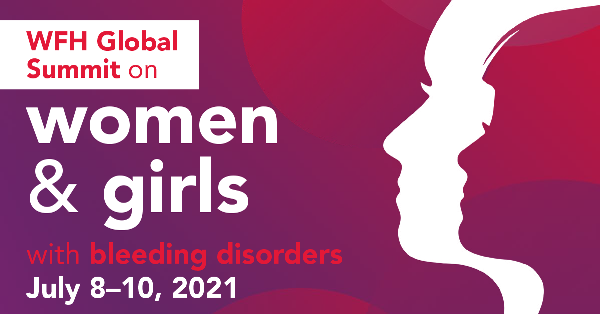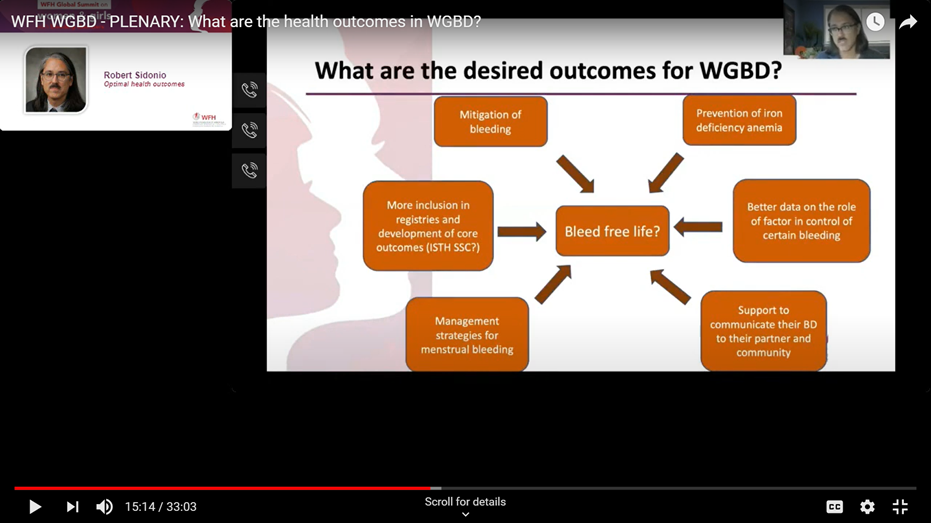SUZANNE O'CALLAGHAN
Suzanne O'Callaghan is HFA Policy Research and Education Manager
WFH (World Federation of Hemophilia) staged the second Global summit on women and girls with inherited bleeding disorders in July 2021. This was a virtual meeting for women with bleeding disorders, patient organisations, healthcare professionals and other supporters from around the world to exchange information and experiences.

Click here to access the Summit recordings
The Agenda covered topical issues in diagnosis and management, how women are advocating for better care, and the ways they are getting their voices heard. This included plenaries and education sessions on diagnosis, multi-disciplinary care and self-advocacy. There were ‘hot topic’ sessions: from oral health in sexual intimacy and what treatment products women would like to see available, to gynaecologists in comprehensive care and stigma in talking about bleeding.
There were also sessions about ‘toolkits’ – sharing the language and tools to describe, record and report bleeding disorders in women and girls. For effective treatment and care, understanding bleeding disorders in females is crucial, but it involves discussions between patients and health professionals where this information can be reported and assessed objectively – where everyone is speaking the same language. Joanna McCosker explores this further in her article How to talk about periods with pre-adolescent girls in this issue of National Haemophilia.
The WFH summit has global representation in its presenters as well, and it was great to see Australian Susie Couper chairing the final toolkit discussion on actions and ways to address the disparities in care, treatment and diagnosis. Susie is on the HFWA Committee and is a member of the WFH women with inherited bleeding disorders committee.
Advocacy around treatment and care relies heavily on data as evidence and if we are to improve the health and quality of life of women and girls with bleeding disorders, collecting consistent data on this will be essential.
One very topical plenary asked three questions:
Dr Robert Sidonio is a leading US haematologist specialising in women and girls with bleeding disorders and discussed the importance of collecting data about women and girls into bleeding disorders registries. This is new work that involves defining what data about female bleeding needs to be collected and how to restructure the databases to measure relevant treatments and outcomes.
Dr Sidonio described some US-based projects that had attempted this and outlined some of the issues they raised – for example, the diversity of bleeding disorders and treatments in women and girls and inconsistent documentation of heavy menstrual bleeding, joint damage and post-partum haemorrhage. He thought the new VWD (von Willebrand disease) guidelines may improve this, as they take into account the different patterns of bleeding symptoms in females. Quality of life impacts are also more common in females with mild bleeding disorders than males due to heavy menstrual bleeding and complications such as iron deficiency. He highlighted the benefits of having an obstetrician/gynaecologist as part of the comprehensive care team.

Following Dr Sidonio’s presentation, Declan Noone from the European Haemophilia Consortium looked at data and why it matters. He explained some of the issues with registries – that they have not been designed to collect information on ‘minor’ bleeds, eg, nose, gum, menstrual, sub-clinical, reported bleeding. Moreover, for advocacy, good statistical data is very important but aligning it with the personal story to explain the human experience of the statistics is very important, otherwise the data will be misunderstood. Another complicating factor is that there have not been consistent and objective ways to collect information on health outcomes for females – for example, a woman might not judge her bleeding as a problem if all the women in her family have very heavy periods, but in surveys will comment on being weary of the ‘monthly bloodbath’. Finding effective ways to measure symptoms like heavy menstrual bleeding and its impact on quality of life will make a big difference to meaningful data collection.
This is very relevant to our work in the HFA The Female Factors project to understand and explain bleeding disorders in women and girls. We are looking forward to the conference session on women and girls in our 2021 national conference, where we will be exploring this further!
Haemophilia Foundation Australia acknowledges the Traditional Owners and Custodians of Country throughout Australia, the land, waters and community where we walk, live, meet and work. We pay our respects to Elders past and present and extend that respect to all Aboriginal and Torres Strait Islander peoples.
Sign up for the latest news, events and our free National Haemophilia magazine